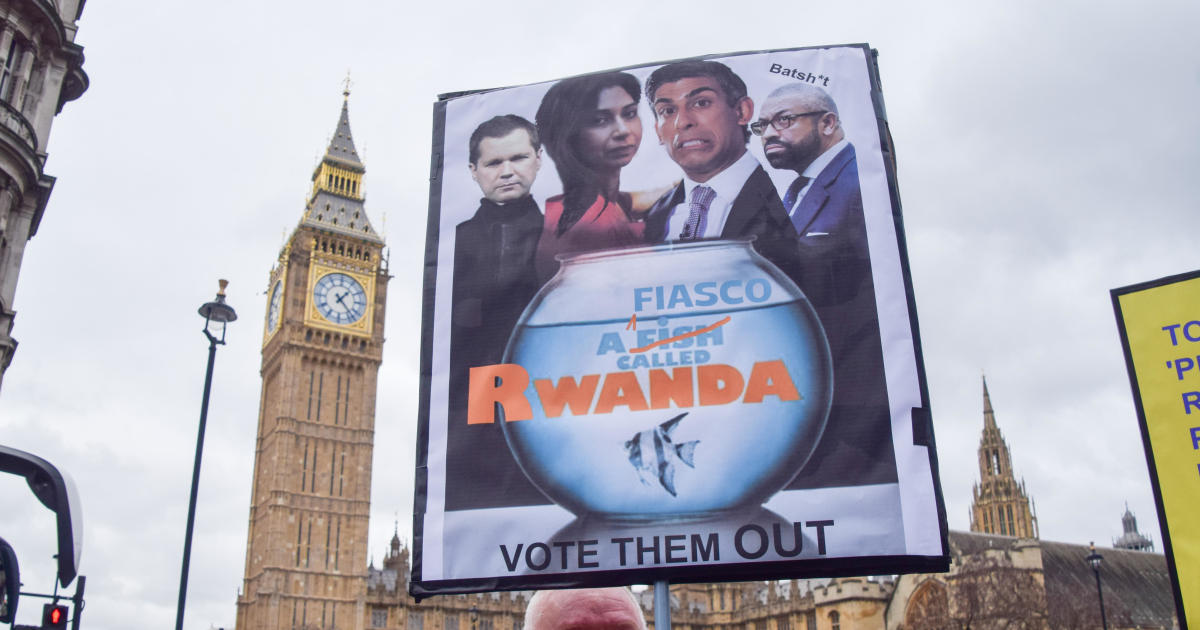U.K. Supreme Court rules Boris Johnson's pre-Brexit suspension of Parliament unlawful
London — The Supreme Court of the United Kingdom has declared Prime Minister Boris Johnson's suspension of Parliament just weeks before the deadline for Britain to leave the European Union unlawful. Johnson was accused of suspending, or "proroguing" the legislature to limit the time lawmakers have to debate and intervene in his Brexit policy. He had insisted the prorogation was standard operating procedure for a new prime minister, and that it had nothing to do with the looming Brexit deadline.
Lady Hayle, President of the Supreme Court, said Tuesday that she and the other 10 justices had reached a unanimous decision that Johnson's move to send the lawmakers home before such a monumental change in the nation's trajectory was unlawful. Parliament, she said, "has a right to a voice in how that change comes about."
It was a devastating blow to Johnson, as the high court cleared the way for Parliament to reconvene immediately to resume debating his Brexit plans. The ruling by the 11 justices was in line with a previous decision by a Scottish court, which also found Johnson's move to suspend parliament was illegal, and null and void.
"Parliament has not been prorogued. This is the unanimous decision of all 11 justices," Lady Hale said. She noted the "quite exceptional circumstances" under which Johnson had attempted to suspend Parliament, and said the "effect on the fundamentals of our democracy was extreme."
Hayle said Johnson's government had given "no justification" for the five-week suspension, which she noted would normally last just four to six days. The government, she said, failed to explain "why it was necessary to bring normal parliamentary business to a halt five weeks before" the Brexit deadline.
What next?
These are uncharted waters for both the United Kingdom and the EU; no nation has ever tried to extrapolate itself from the 28-nation bloc before, so it's unclear what exactly will happen next.
House of Commons Speaker John Bercow told journalists outside Parliament after the ruling that he had "instructed House authorities to undertake such steps as are necessary to ensure that the House of Commons sits tomorrow, and that it does so at 11:30 a.m."
Bercow's position as speaker is ostensibly non-partisan, thought he has been accused by Brexiteers of trying to thwart the government's plans to leave the EU by using his powers to set the schedule in the House of Commons.
He said Tuesday that as soon as the Members of Parliament got back to work on Wednesday, "there will be full scope for urgent questions and ministerial statements, and for applications for emergency debates," making it clear that no time would be wasted as the lawmakers work to express their political will — the will that the Supreme Court said they were unlawfully denied by Johnson for the last couple weeks.
Johnson's office said Tuesday that he would ignore mounting calls to step down from the premiership. He was also cutting short his trip to New York for the United Nations General Assembly to return home overnight. That will get him back to London in time to face lawmakers' questions in Parliament on Wednesday.
Addressing the U.N. on Tuesday, a defiant Johnson immediately addressed the ruling against him.
"I have the highest respect of course for our judiciary and for the independence of our courts. But I must say I strongly disagree with this judgement," he said. "We in the U.K. will not be deterred from getting on and delivering on the will of the people to come out of the EU on October the 31st, because that is what we were mandated to do."
It was unclear how he intended to do that, however. As of Tuesday, the October 31 deadline remained in place, but according to law (more on that in a second), Johnson cannot deliver Brexit without a deal in place, and he appeared nowhere near reaching a deal with Brussels.
Johnson's Brexit charge
Johnson has vowed for weeks to pull Britain out of the European Union by the October 31 deadline, with or without a deal laying out future trade and customs arrangements. He has touted, meanwhile, ongoing negotiations with the EU to hash out a new withdrawal agreement to replace the one his predecessor Theresa May reached with Brussels, but failed three times to get the British Parliament to endorse.
Economists, business leaders and even politicians from his own Conservative Party have issued dire warnings that a no-deal Brexit could severely damage the U.K. economy and cause shortages of food and medicines as log-jams form at ports. The prime minister has dismissed those warnings as "fear-mongering," insisting they are overstated and that the U.K. will be prepared for the divorce with or without a deal.
But resistance to a no-deal breakup is so strong in Parliament that, in the days before Johnson sent them all home, lawmakers passed legislation making it illegal for him to forge down that path. The vote on September 4 means that Johnson (if he can even hold onto his position as prime minister for that long) will be in violation of the law if he tries to take Britain out of the EU with no deal in place.
If he doesn't secure a deal in the days before Halloween, Johnson is now required to go back to Brussels and seek another delay to the Brexit process, something he has vowed never to do.
The "backstop" problem
The sticking point in the agreement that May negotiated with the EU is the "backstop" provision for the Irish border. The clause was written to ensure that, regardless of other trade and customs terms, the border between Northern Ireland, which is part of Britain, and the Republic of Ireland, which is an independent nation and EU member, remains open as it has since the late 1990s.
Ireland's government and the EU insist it is vital to ensure that border stays open, without security checkpoints and with minimal customs checks, to avoid rekindling the sectarian tension of "The Troubles" that ended with the landmark Good Friday Agreement.
That pact, which officially took effect in December of 1999, ended decades of violence and established the partially devolved government in the British territory of Northern Ireland. It also opened up the border that divides the Irish island, creating a friction-less and virtually imperceptible (apart from road signs) crossing point between the U.K. and the EU. It is the only land border between Britain and the bloc.
The problem is that ardent supporters of Brexit, including Johnson, say the backstop as negotiated by May could effectively leave the whole U.K. beholden to the EU's trade rules indefinitely, even after Brexit.
Europe has repeatedly called on Johnson's government to put forth a viable alternative to the Irish backstop as written in May's draft. Johnson's negotiators did, after weeks of delay, send some ideas to Brussels last week, but the Europeans dismissed them as untenable and insufficient.



